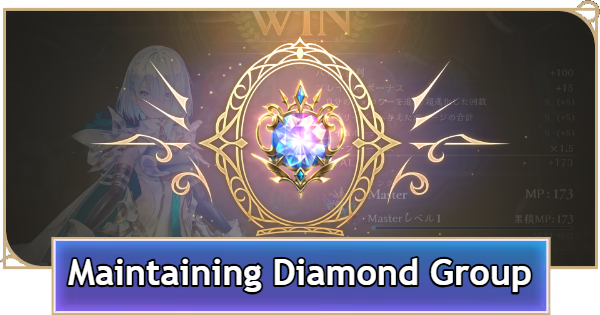Maintaining Diamond Tier Group in Shadowverse: Worlds Beyond. The guide explains the key factors that are important for ranking up and maintaining your group.
Table of Contents
Introduction
About This Article

In this article, the author, who has reached Master Rank in Shadowverse: Worlds Beyond, will explain the key factors they believe are important for ranking up and maintaining your group.
Mainly Explaining How to Maintain Diamond Group
Since your rank increases by spending time playing, this article will focus on how to maintain your Diamond Group rank.
Content for Intermediate Players and Above
This article is mainly aimed at intermediate players and above. For beginners who started with this game, we recommend enjoying it freely without worrying about your group.
The Level of Diamond Group Varies by Rank
The level of Diamond also varies by rank. This article will primarily focus on the Diamond tier within the AA to Master ranks.
Maintaining Diamond is Difficult
Only players with high win rates are matched in Diamond, so trying to maintain a high win rate within that group is extremely difficult. Even pro players can drop to Sapphire. Please read this with the understanding that maintaining Diamond is very tough.
Self-Introduction
Here is a brief introduction to the author of this article.
*Some information has been obscured to prevent personal identification.
Author's Info (Worlds Beyond)

| Rank | Master |
|---|---|
| Playtime | 4-12 hours a day |
| Playstyle | Play a lot, try every option |
| Frequently Used Deck | Puppet Portalcraft |
Previous Game Experience

| Shadowverse History | From the 2nd expansion of the previous game to the final one |
|---|---|
| Rank | Reached Grand Master every season Total Ranked Match wins: 20,000+ |
| Tournament Record | Has placed high in large official tournaments |
What to Do Before a Match
- Understanding the current meta is key
- Try to choose your deck from Tier 1
- If you prioritize consistency, choose a "deck with a low brick rate"
- Deepen your understanding of each deck
Understanding the Current Meta is Key

To maintain your rank in the Diamond tier, it's crucial to have a correct understanding of the current meta. Get a general grasp of the deck lists for Tier 1-2 decks, their matchups, and their finishing methods.
Try to Choose Your Deck from Tier 1
For the deck you use, it's recommended to choose one from Tier 1 that suits your playstyle. Tier 1 decks have few unfavorable matchups and can handle a wide range of situations depending on your play. They also have powerful finishers, making them consistently easy to win with and essential for aiming to maintain the Diamond rank.
Tier 2 and Lower Decks are Risky
While Tier 2 and lower decks have their strengths, they often have more unfavorable matchups depending on the meta, lack consistency, or are easily countered, making them unsuitable for consistently winning in Ranked Matches over the long term.
Prioritize Consistency, Choose a "Deck with a Low Brick Rate"

Among Tier 1 decks, decks with few bad draws and multiple win conditions are especially recommended. For example, Puppet Portalcraft has a good balance of tempo with low-cost followers, draw, removal, and healing. It's very consistent because you can flexibly change your win condition depending on the opponent, which is why I chose Puppet Portalcraft.
High-Roll Decks are Inconsistent
High-roll decks like Runecraft Spellboost have explosive potential, but you can also lose helplessly due to low-rolls. Especially in the Diamond tier, your opponent's skill level is high, and you might not be able to push through even with a good hand. It's best to avoid them if you want to win consistently.
High-Difficulty Decks are for Experts

Decks like Pixie Forestcraft or Artifact Portalcraft, which are "the strongest if you can master them," have constantly branching play lines and require a high level of game sense and decision-making. It's difficult to maintain a high win rate unless you are extremely skilled with them. If you're not confident, you'll likely have a better win rate using a deck that is both simple and strong.
Deepen Your Understanding of the Deck

Once you've decided on a deck, first learn its basic game plan and how to play in various matchups. Instead of jumping straight into ranked, it's recommended to check your mulligans and plays in Private Matches or Practice first.
Understand Your Opponent's Deck
It's important not only to understand your deck, but also to grasp your opponent's win conditions and lethals. This allows you to make judgments like, "If I get them down to this much defense, I have lethal" or "I can still survive at this defense", which leads to a higher win rate.
Learn from Pro and Top Players' Matches
If you want to improve further, we also recommend checking out streams and social media from pro players and top rankers. They often explain the reasoning and decision-making behind their plays, which can be very helpful.
Use Gamewith's Information
Gamewith has many articles featuring the latest deck lists from pros and guides on basic strategies for each deck. Please feel free to use them as part of your information gathering.
Things to Be Careful of During a Match
- Try to think during your opponent's turn
- Eliminate careless mistakes
- Be careful of playing on autopilot
- Always be aware of your win and loss conditions
Try to Think During Your Opponent's Turn

There's a lot you can do during your opponent's turn. Use it as preparation time to make your turn smoother, such as by organizing public information, simulating the next development, and reading their hand from their thinking time.
Organize Public Information
Keep track of things like the number of Artifacts, Fairies, and Puppets, and the types of cards added to their hand. In particular, if you know the type of Ominous Artifact, you can somewhat predict whether they have lethal next turn, their removal range, and so on.
Just Counting Can Increase Your Win Rate

Sometimes, just counting and keeping track can increase your win rate. For example, the total number of "Gear" for Artifact Portalcraft is important. Knowing that "if they haven't collected 11 by 10 Play Points, Masterwork Artifact won't come out" can be a deciding factor in the match.
Eliminate Careless Mistakes
Even small mistakes, like meaningless trades, burning cards from your hand, or misusing Evolution and Super-Evolution, can lead directly to a loss. Aim to eliminate all preventable mistakes.
Be Careful of Playing on Autopilot
Even for actions that seem "correct" at first glance, it's important to develop the habit of pausing to consider if there's a better option. For example, if you have a habit of unconsciously playing Godwood Staff on turn 3 as Forestcraft, you might miss an opportunity when a chance to push with your field presents itself in the early game.
Hard to Notice on Your Own
This kind of "autopilot play" is hard to notice on your own, and you often end up wondering 'why can't I win?' To improve, try to play with intention and observe other people's matches to find differences between their play and yours.
Always Be Aware of Your Win and Loss Conditions

Based on your hand and public information, always think, "How do I win this game?" and "What developments will make me lose?" Being conscious of the turning points of the match will improve the precision of your play.
Read the Win/Loss Conditions
It's important to disrupt your opponent's plan while forcing plays that lead to your own win condition. This decision-making skill isn't something you can acquire immediately, but it will gradually be polished by playing many matches.
Force Developments Your Opponent Dislikes
For example, against Artifact Portalcraft, if you line up followers with 4 or more defense, they can't clear them with just Ominous Artifact γ, forcing them to use EP (Evolution Point) or other resources. By creating situations your opponent dislikes, you can naturally steer the game in your favor.
What to Do After a Match
- Briefly review your play
- Check for changes in the meta
- Take a moment to calm down
- Try recording your match history
Briefly Review Your Plays

You don't have to do it for every match, but if there was a moment where you think, "I might have won if I had done that," reviewing it with a replay can broaden your options for similar situations in the future.
Check for Changes in the Meta

If you're having more tough matches even without making any particular mistakes, there's a possibility the meta has changed. Check social media to see if any strong winning deck lists have been shared. If the decks you have a very unfavorable matchup against have increased, it might be a good idea to switch decks.
Take a Moment to Calm Down
No matter how well you play, there will always be unwinnable games due to luck. Even when you encounter such matches, it's important to remain calm and approach the next game without getting flustered or angry. Letting your emotions affect your play will lead to more mistakes and a vicious cycle.
Try Recording Your Match History
By tracking your results, it becomes easier to see your form and the threshold for demotion to Sapphire. In my experience, in the Diamond tier, you don't need a high win rate; as long as you don't have a significant loss streak, you can maintain your rank. In fact, my goal was not to have a negative win-loss record over about 20 games.
How to Stay Motivated
- Don't worry about getting demoted
- Take care of your physical and mental health
- Work towards some kind of goal
Don't Worry About Getting Demoted

I've explained how to maintain Diamond rank, but as I mentioned at the beginning, it's difficult even for pros to consistently stay in Diamond. Just a bit of bad luck can instantly demote you to Sapphire or Ruby.
Take Care of your Physical and Mental Health
This may seem obvious, but playing while tired or sleepy will lower the quality of your play without you even realizing it. We recommend playing in top condition to avoid losing matches at crucial decision points.
Calm Down After a Losing Streak
After a losing streak or demotion, your judgment may be impaired, so it's a good idea to take a break from Ranked Matches and do some information gathering.
Work Towards Some Kind of Goal

If your only goal is to maintain Diamond, it often becomes difficult to keep going in the long run. Therefore, it's easier to stay motivated if you have another purpose or goal, and treat maintaining Diamond as a means to that end.
Any Goal is Fine
The goal can be anything, like "I want to end the season with a Diamond maintenance rate of X% or higher," "I want to practice for a tournament," "I want to be the best among my friends," or "I want to show off on social media." Anything is fine as long as it keeps you motivated.
Finally
The methods introduced in this article are just what I personally pay attention to in order to maintain Diamond rank, so they are not the only correct way. I hope the content of this article can be of some help to you all. Thank you for reading this far.
Related Articles

New Card Pack: Blossoming Fate

Recommended Guides
| Popular Recommended Articles | ||
|---|---|---|
 Reroll Guide Reroll Guide |  Strongest Decks Strongest Decks |  Pro-Curated Decks Pro-Curated Decks |
 Card List Card List |  Event Information Event Information |  Invitation Code Invitation Code |
| Recommended for Beginners | ||
 Beginner's Guide Beginner's Guide |  First Farer Missions First Farer Missions |  Free-to-Play Decks Free-to-Play Decks |


